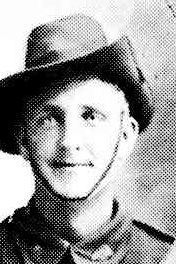
STUART, Peter Fitzalan MacDonald
| Service Number: | 378 |
|---|---|
| Enlisted: | 1 September 1914 |
| Last Rank: | Lieutenant |
| Last Unit: | 49th Infantry Battalion |
| Born: | Rockhampton, Queensland, Australia, 7 February 1894 |
| Home Town: | Rockhampton, Rockhampton, Queensland |
| Schooling: | Rockhampton Grammar School |
| Occupation: | Jackaroo |
| Died: | Killed in action, Mouquet Farm, France, 4 September 1916, aged 22 years |
| Cemetery: |
No known grave - "Known Unto God" |
| Memorials: | Rockhampton Grammar School WWI Honour Roll, Villers-Bretonneux Memorial |
World War 1 Service
| 1 Sep 1914: | Enlisted AIF WW1, Private, 378, 9th Infantry Battalion | |
|---|---|---|
| 24 Sep 1914: | Involvement Private, 378, 9th Infantry Battalion, --- :embarkation_roll: roll_number: '9' embarkation_place: Brisbane embarkation_ship: HMAT Omrah embarkation_ship_number: A5 public_note: '' | |
| 24 Sep 1914: | Embarked Private, 378, 9th Infantry Battalion, HMAT Omrah, Brisbane | |
| 4 Dec 1915: | Promoted AIF WW1, Corporal, 9th Infantry Battalion | |
| 27 Feb 1916: | Transferred AIF WW1, Corporal, 49th Infantry Battalion | |
| 17 Mar 1916: | Promoted AIF WW1, Second Lieutenant, 49th Infantry Battalion | |
| 8 Jul 1916: | Promoted AIF WW1, Lieutenant, 49th Infantry Battalion |
Help us honour Peter Fitzalan MacDonald Stuart's service by contributing information, stories, and images so that they can be preserved for future generations.
Add my storyBiography contributed by Faithe Jones
Peter Fitzallan MacDonald Stuart was born 7 February 1894 and grew up in Rockhampton.
Stuart attended The Rockhampton Grammar School from 1903 – 1913 and during that time was a talented athlete and demonstrated leadership from an early age. Whilst at the School, he was active in many co-curricular activities including tennis, cricket and rowing. He excelled at Rugby where he was Vice-Captain of the First XV in 1911 and described as an “unselfish tower of strength” to the team. In 1912 he was a member of the Sports Committee, as well as Captain of the Rowing and Rugby Clubs. In 1913 Stuart led the First XV as Captain. Further proving himself to be a well-rounded athlete, Stuart also won the School Challenge Cup (now Archer Cup) in 1911 and 1913. During his time at RGS, Stuart was heavily involved with Cadets. In 1912 he travelled to Canada to represent RGS and Queensland at the Imperial Cadet Competition at the Canadian National Exhibition. As Senior Day Prefect, his legacy was improvement of behaviour of the boys in the playground.
After school, Stuart worked as a Jackeroo on his uncle’s cattle property while waiting to enter Duntroon Military College. In support of this ambition, former Headmaster Mr Wheatley wrote, “he is a boy of enormous strength of character, fit to lead, with a good influence over his fellows. He will make an ideal soldier.” Knowing entry to Duntroon would delay his joining the war effort, he enlisted with the Australian Imperial Force at age 20 on 1 September 1914. Stuart was assigned to the 9th Battalion as part of the First Division who arrived in Egypt in December of the same year. He undertook intensive training before being deployed to the Gallipoli campaign. During his time there, Stuart was wounded and transferred to Malta. Once recovered, he returned to Gallipoli and served until the campaign came to an end. After Gallipoli, Stuart remained in Egypt with his Battalion before being shipped to Marseille and making his way north to the Somme region. In February 1916, Stuart was transferred to the 49th Battalion which was predominantly composed of men from Queensland. In June 1916, Stuart attended a six-day school of instruction in the field, learning the techniques required to become a bombing officer. He would go on to form part of the Australian contingent in the taking of Mouquet Farm, where he was killed in action on 4 September 1916. Stuart’s death was reported in the School’s annual magazine in 1916. The following was written about Stuart, all the qualities that we are accustomed to associate with Peter Stuart – strength, courage, hearty good nature, patience, in short manliness – were proved and tested and found incorruptible. Stuart was one of nature’s gentleman. He died as he lived, chivalrous to the last.
Courtesy of Mrs Rachel Trump, Alumni Engagement Officer, Communications & Development
The Rockhampton Grammar School
Biography contributed by Peter Rankin
Peter was a Gallipoli veteran, where he was wounded in action.









